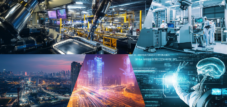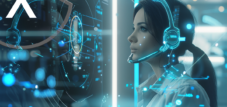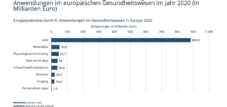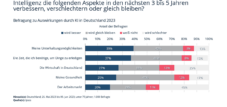Published on: March 29, 2025 / update from: March 29, 2025 - Author: Konrad Wolfenstein

Artificial intelligence in medicine & education: Do doctors and teachers become superfluous? How AI changes professions - picture: xpert.digital
Doctors and teachers of the future: the role of AI in healthcare and education - an outlook on the future - supplement instead of replacement?
The Age of the AI revolution or evolution in healthcare and education?
The world is located in the middle of a technological revolution, the driving force of which is artificial intelligence (AI). Almost every industry already experiences profound changes through AI systems, and the healthcare system and education are no exception. The promises are tempting: more efficient diagnoses, personalized learning paths, improved accessibility and cost savings. However, with the advancement of increasingly powerful AI applications, concern also increases from a possible job loss and the dehumanization of basic social areas.
Statements like that of Bill Gates, who predicts that AI could replace many doctors and teachers within the next decade, strengthen this debate. It is important not to dismiss such predictions lightly. They reflect rapid progress in the field of AI and raise important questions about the future of work and society.
This analysis aims to extensively examine the question of a possible replacement of doctors and teachers by AI in the next ten years. We will do this:
- Examine the current applications of AI in medicine and education in detail.
- Analyze expert opinions from the fields of medicine, education and AI research.
- Evaluate the potential advantages of AI in relation to efficiency, accuracy, accessibility and personalized learning.
- Show the current restrictions and ethical challenges in the use of AI critically.
- Give a realistic assessment of the future role of AI in medicine and education, whereby the probability of supplement is in the foreground instead of a complete replacement.
Suitable for:
AI in medicine: from diagnostics to personalized treatment
The integration of AI into the healthcare system is already in full swing. AI systems are used in a variety of areas, from diagnostic support to the development of new medication.
Diagnostics
AI algorithms analyze medical images (X-rays, CT, MRI) with impressive precision and can recognize subtle anomalies that may escape human radiologists. They support the early detection of cancer, cardiovascular diseases, eye diseases and others. AI-supported systems analyze patient data to identify risk factors and to develop personalized prevention strategies. In pathology, AI helps to analyze tissue samples to diagnose and classify diseases such as cancer.
Treatment
AI plays a key role in the development of personalized treatment plans that are tailored to the individual genetic and health characteristics of every patient. AI systems analyze large amounts of clinical data to predict the effectiveness of different treatments and optimize the dosage of medication. In surgery, AI-controlled robot surgeons support the implementation of high-precision interventions. KI accelerates the development of drugs by identifying potential preserves of active ingredients and predicting their effectiveness.
Further applications
AI-based chatbots answer patient questions, make appointments and give medical advice. AI systems monitor the health of patients from afar and recognize warning signs for complications at an early stage. KI helps with the management of hospital resources and the optimization of work processes.
AI in education: personalization and automation for better learning results
Ki also moves in and promises to change learning fundamentally.
personalization
AI-supported learning platforms adapt the level of difficulty and content to the individual needs and the learning speed of each student. Intelligent tutorial systems offer personalized support and feedback. AI systems analyze student data to identify learning gaps and to propose targeted support measures.
automation
AI takes on administrative tasks such as the assessment of tests and homework, which relieves teachers. AI-based systems recognize plagiarism and ensure academic integrity. AI automatically generates exercises and test questions.
Further applications
AI-based chatbots answer student questions and offer learning support around the clock. Virtual reality (VR) and augmented reality (AR), supported by AI, create immersive and interactive learning experiences. AI systems analyze learning data to recognize trends and patterns and optimize the curriculum.
Suitable for:
- Artificial intelligence in healthcare: Potential €1.1 trillion savings from AI applications in Europe
Expert opinions: addition or replacement?
The question of whether AI will replace doctors and teachers is the subject of intensive debates. While some experts see the potential for a extensive replacement, others emphasize the importance of the human component in these professions.
Proponents of a replacement
These experts argue that AI is able to do many tasks that are currently carried out by doctors and teachers more efficiently and cheaply. They refer to the ability of AI systems to analyze large amounts of data, to recognize patterns and to make precise predictions. In AI, you see an opportunity to improve access to health care and education, especially in under -providing areas. They believe that AI can automate administrative tasks and provide personalized services, which means that the system overall becomes more efficient.
Skeptic of a replacement
These experts emphasize the importance of human interaction, empathy, critical thinking and creativity in medicine and education. They argue that AI is unable to fully grasp the complex social and emotional aspects of these professions. They indicate the ethical concerns that are associated with the use of AI in sensitive areas such as health care. They emphasize the importance of human supervision and ethical decision -making that AI cannot currently do.
The majority of the experts seem to agree that AI will complement doctors and teachers rather than replace. In AI you see a powerful tool that can expand the skills of human specialists and help you to do your work more effectively. However, the human component will continue to play a crucial role.
The advantages of AI: efficiency, accuracy and accessibility
The use of AI in medicine and education offers a number of potential advantages:
Efficiency
AI automates administrative tasks, accelerates diagnostic processes and optimizes treatment plans, which reduces the workload for specialists.
accuracy
AI systems analyze data with high precision and can recognize subtle patterns that may escape human experts, which leads to more precise diagnoses and better results.
accessibility
AI-supported telemedicine and remote monitoring expand access to health care and education, especially in underserved areas. AI chatbots and virtual assistants offer support around the clock and answer questions.
personalization
AI adapts learning content and treatment plans to the individual needs of each individual, which leads to more effective and appealing experiences.
Suitable for:
- From language models to AGI (General Artificial Intelligence) – The ambitious goal behind “Stargate”
The restrictions and challenges of AI: ethical concerns and the importance of humanity
Despite her promising possibilities, KI also shows a number of restrictions and challenges:
Ethical concerns
The use of AI in sensitive areas such as health care raises ethical questions regarding data protection, algorithmic bias, responsibility and transparency.
Human interaction
AI cannot completely replace human interaction, empathy and emotional support, which are essential for medicine and education.
complexity
Ki has difficulty coping with complex and unpredictable situations that require human judgment and creativity.
Dependency
Excessive dependence on AI can affect the development of critical thinking and problem -solving skills.
Equality
Access to AI technologies is not always equal, which can lead to an enlargement of the digital gap.
A realistic view: addition instead of replacement
The analysis of the current applications, expert opinions, potential advantages and restrictions from AI in medicine and education indicates that a extensive replacement of doctors and teachers within the next ten years is unlikely. Rather, a scenario is emerging in which AI complements the skills of human specialists and improves their efficiency, accuracy and reach, while doctors and teachers continue to be responsible for complex decisions, interaction with patients and students as well as the human component of care and learning.
In medicine, for example, AI could automate administrative tasks, analyze medical images and create personalized treatment plans, while doctors focus on patient care and the treatment of complex cases. In education, AI could create personalized learning paths, evaluate tests and give students feedback, while teachers focus on promoting creativity, critical thinking and social-emotional skills.
Recommendations for a responsible integration of AI
In order to optimally use the advantages of AI in medicine and education and at the same time to minimize the risks, responsible integration is required:
Ethical guidelines
Clear ethical guidelines and regulatory framework for the use of AI in medicine and education must be developed that address topics such as data protection, algorithmic bias and responsibility.
Initial and continuing education
Doctors and teachers must be equipped with the skills to effectively use and monitor AI-based tools.
Research
Research to reduce bias in AI algorithms and to ensure equal access to AI technologies should be prioritized.
transparency
The transparency and explanability of AI systems must be promoted to strengthen the trust of specialists and the public.
Cooperation
The cooperation between AI developers, medical specialists, educators, political decision-makers and ethics should be promoted to ensure a responsible and useful integration of AI in these areas.
The future of medicine and education in the age of AI
AI has the potential to fundamentally change healthcare and education. By using the advantages of AI and taking into account their restrictions and challenges at the same time, we can shape a future in which AI complements the skills of human specialists and helps us to ensure better health care and education for everyone. The keywords here are “supplement” and “responsibility”. Only if we understand AI as a tool that helps us get better and at the same time keep an eye on the ethical implications, can we ensure that this technology is used for the benefit of humanity.
It is important to recognize that people are irreplaceable in the areas of medicine and education. Empathy, interpersonal relationships, understanding of complex situations and ethical judgment are skills that AI cannot fully reproduce. The future lies in an intelligent cooperation between man and machine, in which AI serves as a powerful tool to expand and support human skills.
Suitable for:
Your global marketing and business development partner
☑️ Our business language is English or German
☑️ NEW: Correspondence in your national language!
I would be happy to serve you and my team as a personal advisor.
You can contact me by filling out the contact form or simply call me on +49 89 89 674 804 (Munich) . My email address is: wolfenstein ∂ xpert.digital
I'm looking forward to our joint project.














